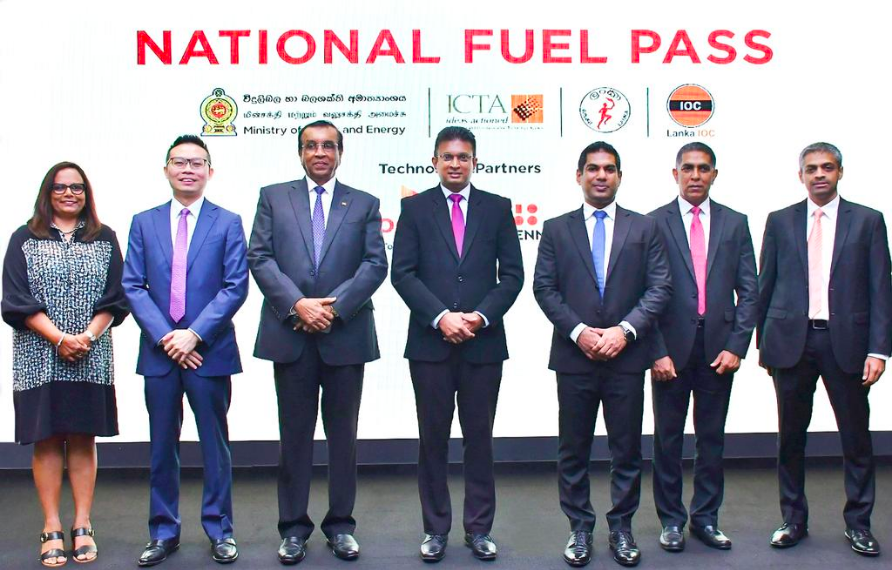The platform was gifted by Dialog and MIT to the Ministry of Power and Energy to manage the fuel crisis in the country

The Ministry of Power and Energy conveyed its appreciation to the country’s leading technology entities, Dialog Axiata PLC, MillenniumIT ESP and ICTA as the facilitators of the National Fuel Pass system. Recently, at an event, the Ministry recognised the three entities for their invaluable and gratuitous contribution and expertise extended towards the development of the platform and the successful implementation of the allocation-based fuel distribution system.
Since implementation, the National Fuel Pass platform has been successfully adopted by 93% of fuel stations across the country, with over 11 million transactions to date. The National Fuel Pass, which was introduced to provide the public with a convenient and easily accessible solution to obtain fuel and facilitate an allocation-based fuel distribution method, has also surpassed 6 million vehicle registrations to-date.
Dialog and MillenniumIT ESP will continue to support the National Fuel Pass platform free of charge over the next three years and will closely work with the Ministry of Power and Energy and ICTA to introduce additional functionality to meet the requirements of special segments. In addition to providing a sustainable allocation-based fuel distribution method to Sri Lankans, the successful implementation of the National Fuel Pass platform contributed to significant national savings, where the monthly expenditure on fuel imports has been reduced from USD 500 Million to USD 230 Million.

Speaking to the gathering, Hon. Kanchana Wijesekera, M.P, Ministry of Power and Energy, claimed “On behalf of the Government of Sri Lanka, I would like to express my sincere gratitude and appreciation to ICTA, MillenniumIT ESP and Dialog Axiata PLC for synergising with the Ministry of Power and Energy to ease the burden of the fuel crisis on the public with the National Fuel Pass initiative. The journey to the National Fuel Pass system was riddled with trial and learning, and I am grateful to all stakeholders for remaining positive and proactive with an unwavering commitment to finding an immediate solution to a national crisis. This effort would not have materialised into the fully-fledged system it is today without the support of Lanka IOC and Ceylon Petroleum Corporation and the voluntary efforts of the individuals from the National Youth Corp and National Youth Council. Our aim was to give each individual a guaranteed fuel quota to manage their day-to-day activities, and, with this system, we have made it a reality today”
Speaking about the initiative, Jayantha De Silva, Chairman of ICTA said, “We are extremely proud to have been a part of this national initiative and to have provided technical advice for the development of the National Fuel Pass. The impact of the National Fuel pass is tremendously visible from an economic perspective as well as from a social perspective. I firmly believe technology can play a major role in solving some of the problems faced by our nation. As the apex body for implementing all ICT projects of the government, we are committed to working with the required stakeholders to drive effective digital solutions that transform the lives of Sri Lankans”.
Commenting, Supun Weerasinghe, Group Chief Executive of Dialog Axiata PLC said, “We are thankful to the Ministry of Power and Energy for inviting us to be a part of this national initiative. When the entire country came to a standstill, we at Dialog, felt that it was our responsibility to help the nation overcome this challenge through the power of technology. With the help of MillenniumIT ESP and ICTA, the Dialog team once again came together during our country’s greatest hour of need and volunteered to provide a solution within a short span of 3 weeks and expedited the operationalisation of the solution to help the nation progress with a sustainable fuel management system.”
Commenting, Shevan Goonetilleke, CEO of MillenniumIT ESP said, “Eliminating fuel queues, saving millions of dollars, and ensuring a fair distribution of fuel to the nation was an outcome of the successful implementation of the National Fuel Pass system. Launching the application at a national scale is undoubtedly challenging, however along with the guidance of the Minister and the excellent collaboration among the Ministry, ICTA, MillenniumIT ESP and Dialog contributed to achieving the ultimate goal. The National Fuel Pass indeed demonstrated how technology can be used to mitigate a national crisis through solutions that can be developed and deployed in a short time. Congratulations to the Minister and all teams involved on the successful completion of this project!”